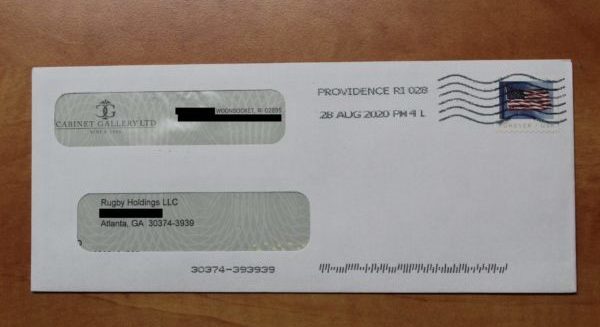
With national elections less than two months away, President Donald Trump and other Republicans are raising alarms about potential election problems, including fraud, with arguments on both sides creating headlines, but an alarming and apparently not-so-unusual mail delivery situation at a leading run rights group’s national headquarters illustrates why concerns about the election may be valid.
An envelope containing what appeared to be a check from a company in Rhode Island to a firm in Georgia ended up in the mailbox of the Second Amendment Foundation, located in Washington state.
SAF founder and Executive Vice President Alan Gottlieb told Liberty Park Press, “I get at least one of these (wrong deliveries) almost every day.”
LPP called a telephone number from the sender that was visible through a window in the envelope, advising that company where their envelope had landed. Cabinet Gallery LTC in Woonsocket, RI did not return the call. The envelope was addressed to Rugby Holdings LLC in Atlanta.
By no small coincidence, Fox News reported nearly 3,000 voters in Georgia have filed complaints with voting officials in that state because they allegedly did not receive their primary ballots.
The New York Times—no friend of the president—ran a piece this week in an effort to pooh pooh concerns that there might be massive vote fraud this year because of the mail ballot. The report had this in the lead: “With concerns mounting over how the country can conduct elections during a pandemic and Democrats pressing for alternatives to in-person voting, President Trump has begun pushing a false argument that has circulated among conservatives for years — that voting by mail is a recipe for fraud.”
The headline said this: “Trump Is Pushing a False Argument on Vote-by-Mail Fraud. Here Are the Facts.”
But “facts” are often opinion disguised as fact, because the New York Post reported late last week about “a top Democratic operative” who said “voter fraud, especially with mail-in ballots, is no myth.”
The Post story said the operative, who spoke under condition of anonymity, had done “dirty work” in municipal and federal elections in New Jersey, New York and Pennsylvania.
Fraud is just one concern about mail-in voting. The Georgia experience is another matter; people can’t fill out ballots if they don’t receive ballots, especially after an election is over.
And what if those ballots wind up in another state?
SAF’s Gottlieb expressed concerns that if the mail is so unreliable that his group frequently gets mail addressed to someone else, in some other part of the country, voting by mail in a national election is going to be more than just a “challenge.”
The BBC is reporting that six states are so far planning voting by mail: California, Utah, Hawaii, Colorado, Oregon and Washington, and more could follow.
With the future direction of the nation at stake, even a small concern about voter fraud, election “irregularities” or mail troubles is not to be taken lightly.